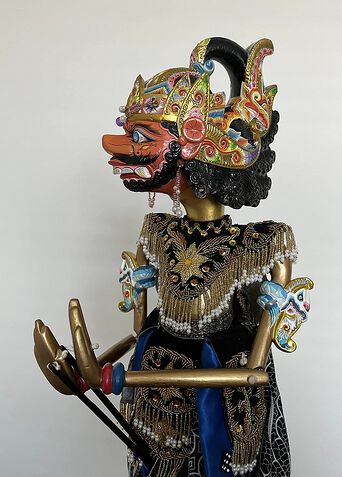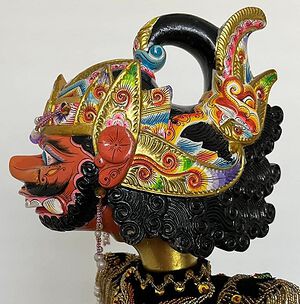Kangsadewa
| Title | Kangsadewa - (Raden) - Mahabharata |
|---|---|
| Other names | Kangsa, Jaka Maruta, Basudewa Putra |
| Size | 65 cm |
| Personal data | Kangsadewa (Kangsa) was born in the country of Bombawirayang, and since childhood lived in the care of ditya Suratrimantra, the younger brother of Prabu Gorawangsa.
Kangsadewa is actually the son of Gorawangsa, the giant king of the Gowabarong country who transformed into Prabu Basudewa and succeeded in having an affair with Dewi Mahira/Maerah (Java), the consort of Prabu Basudewa, king of Mandura. After adolescence, by Suratrimantra, Kangsa was taken to the country of Mandura to claim his rights as the son of Prabu Basudewa. Because he was very powerful, Prabu Basudewa was finally ready to acknowledge Kangsa as his son and was given the position of Duke in the Sengkapura Knighthood. |
| Appearance | Kangsa has white long-sleeve eyes, a pointed nose, and a mustache, which indicates that he is a race of giants. Three layered jambs, trimmed with waders, with fringes of lizards, decorated with eagles on their backs. Some of his hair is tied in dreadlocks, indicating that he is also a knight. |
| Collection | Private collection |
Kangsadewa – (Raden) – Mahabharata
This version of the Kangsa doll is a later addition to the wayang golek and therefore does not appear in Peter Buurman's book.
King Basudewa, from the kingdom of Mandura, and his family lived in the forest as Pasang Pagrogolan (trappers who caught animals and held them in cages).
Gorawangsa was a giant king who saw the beauty of the Queen Maerah, Basudewa’s wife. He fell so in love with her that he transformed himself into King Basudewa, and they made love. The Queen did not know that she made love with Gorawangsa, until her real husband came into bed chamber. The two “Basudewa’s” were fighting, and finally the real king killed Gorawangsa.
King Basudewa was so disappointed with his wife, that he asked his brother Raden Arya Prabu Rukma to take her to the forest and kill her. His one request was that his brother bring back her heart as evidence of her death.
Raden Arya Prabu Rukma could not kill his brother’s pregnant wife, and instead killed a monkey and gave the monkey’s heart to his brother. He then told Maerah to stay in the forest until he could think of what to do with her. The giant Suratimantra, who was the brother of Gorawangsa, found Dewi Maerah wandering in the forest and helped her give birth to a baby giant who she named Kangsa Dewa.
Suratimantra kept the baby and taught him many skills. He told him that he was the son of Queen Maerah, the wife of King Basudewa from the kingdom of Mandura. He also told him that his natural father was killed by King Basudewa.
After growing up, Kangsadewa came to Madura and asked for the country.
Because he was very powerful, King Basudewa was finally willing to recognize Kangsadewa as his son and was given the position of Duke in the Sengkapura Knights.
With the support of Suratimantra, his powerful uncle, Kangsadewa intends to seize the throne of Mandura from the hands of Prabu Basudewa and tries to kill Basudewa's rightful children (Kresna, Baladewa and Subadra). The Kangsa rebellion failed.
Because of his supernatural powers, Kangsa succeeded in gaining and controlling Madura.
The damage to the country of Madura at that time was infinite. The children of Basudewa, Kakrasana, Nayarana, and Rara Ireng (Subadra) were abandoned. The life of the two sons of the king continued to hide and continued to be searched for by Kangsadewa. However good their hiding was, Kangsadewa finally found out, until Rara Ireng had to be run away by Nyai Segopi, Antagopa's wife.
After Kangsadewa heard this, Rara Ireng was chased by Kangsadewa's monster handler. After being chased, deceive Rara Ireng with the words: “Later, if Rara Ireng gets a child from the monster, the child will be bought as a foal, shaved and ridden by the horse”.
Hearing those words, the giant became mad and began to delirium senseless, there is no base and no end. And Rara Ireng was finally able to escape from danger.
In the story of Kangsa Adu Jago (Kangsa Hosts a fight), Kangsa Dewa wanted to marry the king’s daughter Bratajaya, so he hosted a human fight (adu jago) between Suratimantra (his fighter) and Basudewa’s fighter. If Suratimantra won, King Basudewa would have to leave the Kingdom, but if Kangsa lost, he would have to leave the kingdom. King Basudewa asked his other brother Raden Ugrasena to go to Saptaharga and ask Begawan Abiyasa to give him a fighter. Begawan Abisaya gave Bratasena to Ugrasena as a fighter.
According to belief, the Kangsa event happened in Juwana, so the people of that place did not dare to play the Kangsa play, because as long as the play was being played, crocodiles would come up from the river and go to the crowd to face their idol, Raden Kangsa. And the stream called Silugangga is located near the village of Widarakandang, where there is a Widara tree that is fenced; So the tree was named Widarakandang.
The sons of Basudewa, Kakrasana and Nayarana were defeated by him, so that the two brothers had to be hidden. Kangsadewa found out about this and tried to beat the two brothers by holding a competition. Suratimantra proposed Kangsadewa as his champion. In this way, Kangsadewa actually wanted to know where the two Basudewa putlas were hiding. This Adu jago event was only a cover for Kangsadewa to kill the king and family.
During the event Bratasena, Pendawa's second brother entered the ring using the name Jagalabilawa and competed with Suratirnantra. Suratimantra lost in this competition. During the fight between Bratasena and Suratimantra, Raden Kangsa Dewa looked around among the spectators for king’s sons Raden Kakrasana and Raden Narayana to kill them.
Every time Bratasena killed Suratimantra, Kangsadewa’s followers put the body into the Sendhang Penguripan (small spring with magical water), and he came back to life again. Raden Premadi (Bratasena younger brother) realized that the fight was not fair, and asked his faithful servant Petruk to put his magical Kris Pulanggeni into the spring. The water of the spring boiled as soon as Petruk put the Kris in. When Kangsadewa’s followers put the body of Suratimantra into the spring, the body did not come back to life, because it was boiled to death.
Kangsadewa finally stumbled upon Kakrasana and Narayana (king’s sons) and was just about to kill them, when Bratajaya (youngest child of the king) appeared. Kangsadewa stopped what he was doing when he saw the beauty of Bratajaya.
Suddenly, Raden Premadi (Arjuna) shot his arrow right into Kangsadewa’s heart, freeing Kakrasana and Narayana from Kangsadewa’s hands.
Source: History of Wayang Purwa - Hardjowirogo - PN Balai Pustaka – 1982


